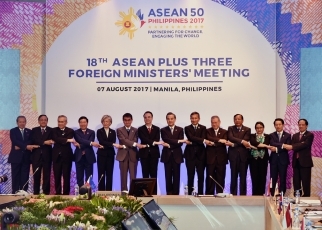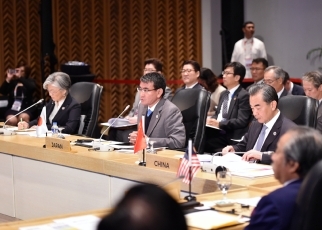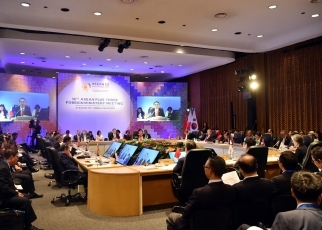Asia
The 18th ASEAN Plus Three Foreign Ministers’ Meeting
August 7, 2017



Foreign Minister Mr. Taro Kono co-chaired the 18th ASEAN+3 Foreign Ministers’ Meeting which was held in Manila, the Philippines, August 7, 10:10 - 12:00 (local time). The overview of the meeting, focusing on Minister Kono’s comments, is as follows.
1 Opening remarks
Following the remarks by Secretary of Foreign Affairs of the Republic of the Philippines, Mr. Alan Peter S. Cayetano, Minister Kono stated that, (1) this year marks the 20th anniversary of the establishment of the ASEAN Plus Three Meetings and Japan welcomes that practical cooperation on the financial and economic front has developed over the past 20 years, and that (2) given the current situation where there are concerns on the rise of protectionism and inward-looking sentiment in the world, Japan hopes to closely cooperate with the ASEAN Plus Three countries, in order to increase the predictability of regional and world economic trends, reduce vulnerabilities, as well as maintain and strengthen the free trade regime.
2 Review and future direction of ASEAN Plus Three cooperation
(1) Minister Kono stated the following seven points centering on Japan’s initiatives related to the ASEAN Plus Three cooperation.
- To respond to the vast demand for infrastructure in Asia, the Government of Japan last year announced “the Expanded Partnership for Quality Infrastructure,” aiming to finance approximately 200 billion dollars for infrastructure projects in ASEAN and the most of the world, over the next five years. In addition, Japan will continue to make efforts to establish and spread international standards for quality infrastructure, based on the “G7 Ise-Shima Principles for Promoting Quality Infrastructure Investment.” Paticuraly, in infrastructure development, it is critical that projects go along with the international standards, including the openness and transparency of infrastructure such as ports, assurance of management in a non-exclusive manner, as well as fiscal soundness of the recipient country. Furthermore, Japan is cooperating with the Mekong Countries as countries holding the key to ASEAN integration. Adding to infrastructure development, Japan is also addressing the realization of “‘vibrant and effective’ connectivity,” in which intra-regional infrastructure is connected and utilized through measures on the software front, such as streamlining customs clearance and developing human resources.
- The ASEAN+3 Macroeconomic Research Office (AMRO), which became an international organization in 2016, initiated the application process for observer status at the United Nations. Japan will continuously make efforts to make AMRO a further trusted and credible institution in the international community.
- The negotiation on the Regional Comprehensive Economic Partnership is one of the critical pillars for economic integration in East Asian. Japan would like to continue to pursue intensive negotiations, in order to achieve an early conclusion of negotiations on a comprehensive, well-balanced and high-quality agreement in terms of market access as well as rules.
- Food security cooperation is also important. By utilizing the ASEAN Plus Three Emergency Rice Reserve (APTERR), Japan will provide rice to the Philippines, Laos and Myanmar. More than six years have passed since the Great East Japan Earthquake. Japan would like to urge countries maintain import restrictions on Japanese food products to remove or alleviate such restrictions based on scientific evidence.
- Japan is promoting the development of industrial human resources taking into account the needs of each country, under the “Industrial Human Resource Development Cooperation Initiative.” Japan is willing to support human resource development and people-to-people connectivity in ASEAN, through such measures as study abroad programs and research cooperation for advanced human resource development that will connect ASEAN and Japan including “Innovative Asia”, which will start accepting students from this September.
- The follow- up of East Asia Vision Group (EAVG) II is also significant. Japan will play a leading role in such areas as public health and higher education. As for the latter, Japan will continue to lead the ASEAN Plus Three inter-governmental working group and continue to make contributions to further promote the mobility of students in the region and ensure their quality.
- Japan welcomes that the new “ASEAN Plus Three Cooperation Work Plan” has been agreed, determining the direction of ASEAN Plus Three in the coming 5 years.
3 Exchange of opinions on regional and international affairs
(1) Minister Kono emphasized the following five points.
- The second launch of an ICBM-class ballistic missile by North Korea on July 28 once again showed that North Korea is pushing ahead with its nuclear and missile development in flagrant disregard of the voice of the international community. Now is the time to apply maximum pressure on North Korea in order to urge North Korea to take actions towards denuclearization. Japan welcomes the adoption of the new strict United Nations Security Council (UNSC) Resolution. All relevant UNSC resolutions including the newly adopted one must be strictly and fully implemented. The abductions issue is a critical problem concerning the sovereignty of Japan and the lives and safety of Japanese citizens. It also constitutes a universal issue among the international community as violation of fundamental human rights. A strong message must be delivered on the abductions issue.
- In seeking the path forward for nuclear disarmament, given that the confrontation between nuclear weapon states and non-nuclear weapon states has become distinctly severe, the reestablishment of mutual trust between the two sides is a critical challenge to substantially advance nuclear disarmament. Japan, as the only country to have experienced atomic bombings, will make persistent efforts in a manner that allows for the deep engagement of nuclear-weapon states, with a view to resolving this issue.
- A free and open maritime order based on the rule of law is the cornerstone of peace and prosperity of the international community. Japan supports the coordinated patrol in the Sulu and Celebes Sea by the Philippines, Malaysia and Indonesia. Japan would also like to draw attention to the importance of regional cooperation, utilizing the framework of the Regional Cooperation Agreement on Combating Piracy and Armed Robbery against Ships in Asia (ReCAAP).
- The threat of terrorism in the Asian region is one of the top priority issues that this region should address in a concrete manner. Japan fully supports the Philippines’ fight against terrorism in Mindanao. Terrorism must not be condoned for any reason, and is categorically condemned. Japan has provided approximately 12 million dollars to the Philippines in this area.
- Japan is currently the Chair of the Japan-China-Republic of Korea (ROK) Trilateral Summit. Stable cooperation among the three countries also contributes to the enhancement of cooperation among the ASEAN Plus Three countries. Japan will continue to coordinate with China and the ROK with an eye to the upcoming Trilateral Summit expected to be held this year.

